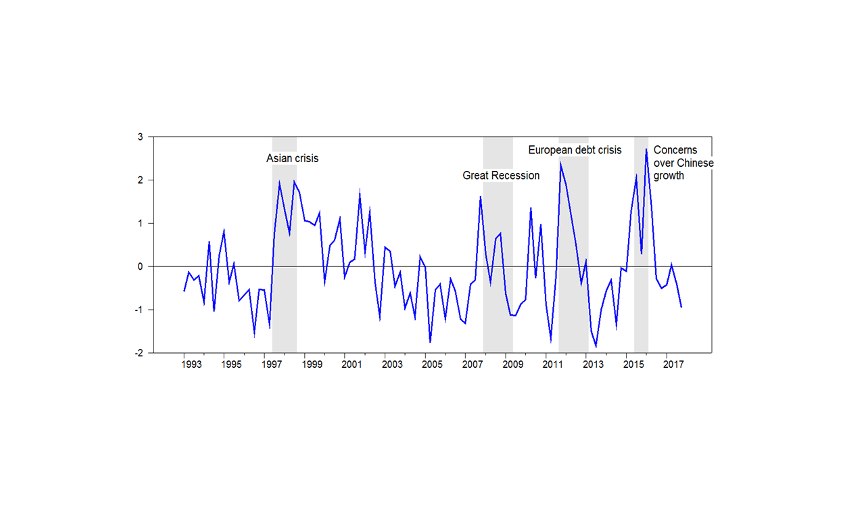That’s a title I borrowed from a paper by Barry Eichengreen; the actual title is “International environment and US monetary policy: a textual analysis” written by Laurent Ferrara and Charles-Emmanuel Teuf:
What role does the international environment play in shaping US monetary policy decisions? To measure its influence, we construct an international indicator extracted from minutes of Fed monetary policy committee meetings.
In a Taylor rule model, we show that the indicator has a significant and negative impact on the fed funds rate. Discussions centred more on the international environment may thus be associated with greater monetary policy easing.

Chart: International environment indicator and major events affecting the global economy Note: The grey areas correspond to major international economic events. Indicator constructed from a textual analysis of FOMC minutes (1993-2017), authors’ calculations
The entire post is here.
I like Barry Eichengreen. I have 2-3 books of his laying around this house somewhere. It’s one of those books that makes me feel smarter when it’s inside my abode and I never read it.
But seriously, I do plan on reading them. I think I did read all of his Bretton Woods book (which you might guess, knowing me, is one of Eichengreen’s smaller books) His book on gold is a MAMMOTH. and I think i’ve read maybe 25% of his book on Brazil bonds or south American bonds er something. What I hate about those kind of books is there often seems to be a form of what I would call “small talk” where academic authors state things that are incredibly obvious, then we jump nearly immediately to the complex equations. My often recurring thought when reading these books is if they would make the effort to at least half-way explain the equations (variables) and maybe even plug in smaller numbers as examples on how the equations breakdown, instead of the dumb*ss smalltalk, the books might actually be useful, and on top of that sell a few copies.
But hey, why do that when if you actually did teaching instead of publishing, you couldn’t talk down from Mount Olympus while charging $200 dollars for textbooks you monopolistically force students to buy, and only about 3 people ever bother to read. The latter way is obviously the more “intelligent” way you would do it if you were a prof concerned about how much students learn. I mean, obviously.